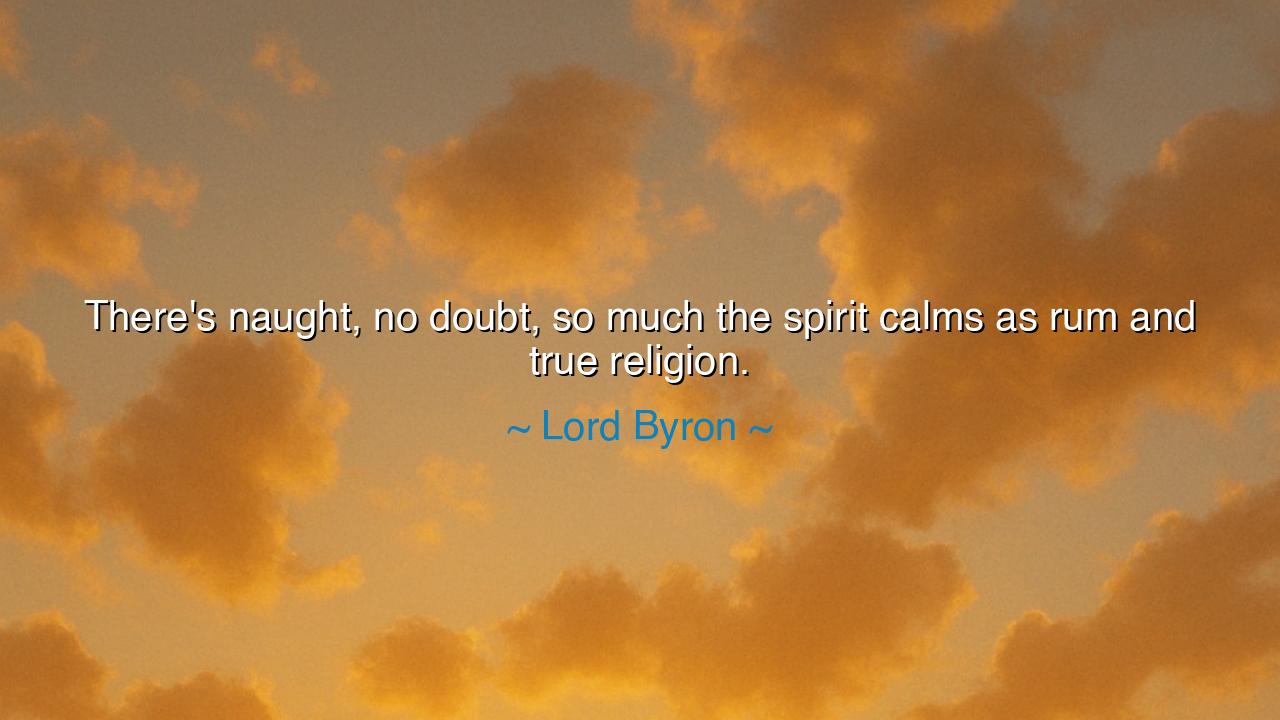
There's naught, no doubt, so much the spirit calms as rum and






When Lord Byron, that tempestuous spirit of the Romantic age, wrote, “There’s naught, no doubt, so much the spirit calms as rum and true religion,” he spoke with a tongue both playful and profound. Beneath his wit lies the eternal tension between the soul’s yearning for peace and the human craving for escape. In his age — as in ours — men and women wrestled with sorrow, guilt, and desire. Byron, who knew the heights of glory and the depths of despair, saw that the human heart seeks solace in two opposite sanctuaries: one in the cup, and one in the sacred. The first numbs the mind; the second awakens it. Both, in their own ways, promise rest to the weary.
The origin of the quote can be traced to Byron’s sharp humor, a blade dipped in philosophy. He was a man of contradictions — a lover of excess and a seeker of meaning. His writings pulse with passion and rebellion, yet beneath them beats a soul haunted by loneliness and guilt. In this saying, Byron wove truth into jest. The rum, symbol of worldly comfort and oblivion, stands for all that mankind uses to soften the sting of existence — pleasure, intoxication, indulgence. True religion, on the other hand, represents the deeper solace found in faith, in surrender, in the belief that life’s storms have purpose. Together, they reveal Byron’s understanding that man’s spirit hungers for peace — whether found in the tavern or the temple.
The Romantic era in which Byron lived was an age of restless hearts. The old certainties of religion were crumbling; reason had unseated faith, and yet science could not soothe the ache of the soul. Men drank, fought, wrote, and prayed — each seeking to quiet the same inner tempest. Byron himself, fleeing scandal and heartbreak, wandered across Europe and the East, seeking redemption through experience. His life was a pilgrimage without shrine, his poetry a confession without priest. He knew firsthand the fleeting calm of wine, and the more enduring but difficult peace of the spirit’s awakening.
To understand his words, let us recall the story of Leo Tolstoy, another great soul who battled despair. Tolstoy, though born long after Byron, mirrored his struggle. After wealth, fame, and sensual pleasure, he fell into a deep emptiness. He had tasted every earthly delight — the “rum” of existence — and found it bitter. Only when he turned inward, seeking meaning through faith and moral awakening, did his heart begin to heal. His “true religion” was not bound by dogma but by compassion and humility. Like Byron’s verse, his life taught that worldly comfort may quiet the body, but only spiritual understanding can calm the soul.
Yet Byron’s irony must not be ignored. He knew that human frailty drives us toward both vices and virtues, sometimes in the same breath. The philosopher may speak of enlightenment, but the sailor still clutches his rum when the sea roars. There is forgiveness in this — for to be human is to falter, to seek peace where we can find it, even if imperfectly. Byron’s words remind us that life is not lived in purity alone, but in the constant balancing between our earthly weakness and our divine longing.
So what, then, is the lesson for us who hear his words across the centuries? It is this: seek your peace, but know its source. Let not the fleeting comfort of pleasure become your master, nor let faith turn to fanaticism. True peace — that which calms the spirit — is found not in escape, but in understanding. Let the cup of life be sipped, not drained; let the heart of belief be humble, not proud. Between the rum and the religion lies the middle path — the acceptance of our humanity, and the pursuit of our higher self.
And when sorrow comes, as it comes to all, remember Byron’s irony and Tolstoy’s truth. Seek warmth where you must, but never forget that the deepest calm is not poured into a glass, nor preached from a pulpit, but awakened within. For the truest religion is that which teaches us compassion — for others, and for ourselves — and the greatest intoxication is not of drink, but of understanding. Live with awareness, and even in your storms, you shall find peace — a peace as deep and still as the sea after thunder.






AAdministratorAdministrator
Welcome, honored guests. Please leave a comment, we will respond soon